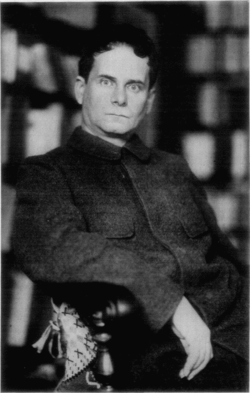- Maximilian Harden
-
Maximilian Harden (a pen name; he was born Felix Ernst Witkowski)[1] (20 October 1861 - 30 October 1927) was an influential German journalist and editor.
Biography
Born the son of a Jewish merchant in Berlin he attended the Französisches Gymnasium until he began to train as an actor and joined a traveling theatre troupe. In 1878 Harden converted to Protestantism and started his journalistic career as a theatre critic in 1884. He also published political essays under the pseudonym Apostata in several liberal newspapers like the Berliner Tageblatt edited by Rudolf Mosse.
From 1892 Harden published the journal Die Zukunft (The Future) - microfiche edition - in Berlin. His baroque style was mocked by former friend Karl Kraus, who even wrote a satire about "translations from Harden".
Initially a monarchist, Harden became a fierce critic of Kaiser Wilhelm II and his entourage around Prince Philip of Eulenburg and Kuno von Moltke. His public accusations of homosexual behaviour - according to Paragraph 175 a criminal offence at that time - from 1906 on led to numerous trials and did sustainable damage to the reputation of the ruling House of Hohenzollern and the German jurisdiction. In reaction Karl Kraus, disgusted by the public display of intimate details, wrote an obituary: Maximilian Harden. Eine Erledigung (A Settlement). By 1914, Harden had again moved sufficiently to the right that he welcomed the German invasion of Belgium, however after the war he supported the signing of the Treaty of Versailles.
In the following years Harden's readership diminished. On 3 July 1922, a few days after the assassination of Walther Rathenau, he was severely injured in an assault conducted by Freikorps members. In the following trial the court ruled that his writings had provoked the two assailants, Bert Weichardt and Albert Wilhelm Grenz. Both were charged and sentenced to 2 years and 5 months and 4 years respectively.
Harden abandoned the publishing of Die Zukunft and in 1923 retired to Montana, Switzerland where he died four years later. His grave is located in Berlin at the Friedhof Heerstraße (Feld 8-C-10 (Reg. 335) (Ehrengrab))
See also
References
- ^ Helga Neumann: Maximilian Harden (1861-1927). Königshausen & Neumann, 2003, p. 15. Neumann states that "the prename Isidor which has often been used in necrologues with negative tendency is incorrect".
External links
- Maximilian Harden, Krieg und Friede, Berlin: Erich Reiss, 1918.
- "The Controversy of Zion", Geoffrey Wheatcroft, 1996, ISBN 0201562340; pp. 203–4 deal with Harden
Categories:- German journalists
- German Jews
- People from Berlin
- Converts to Protestantism from Judaism
- 1861 births
- 1927 deaths
- German history stubs
Wikimedia Foundation. 2010.

